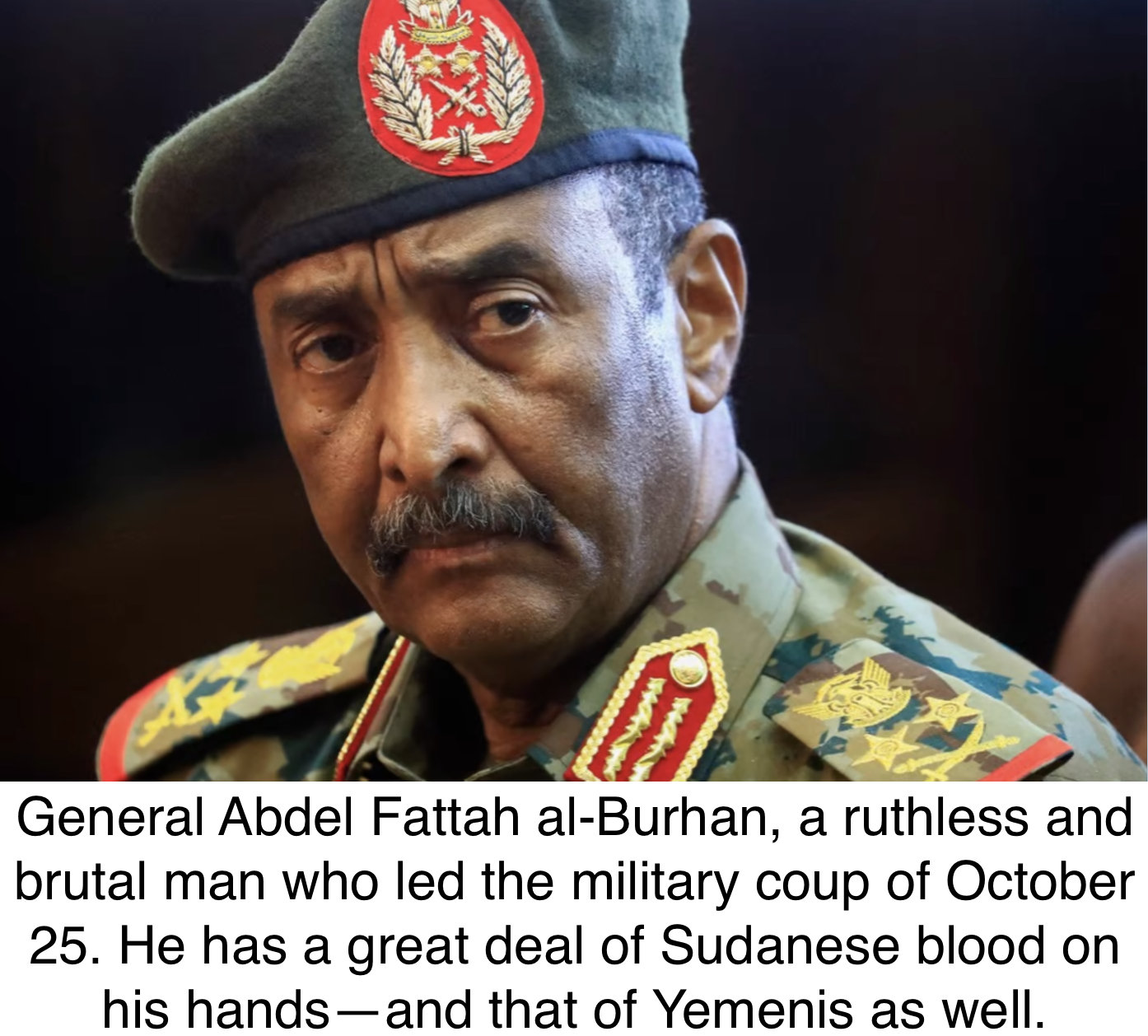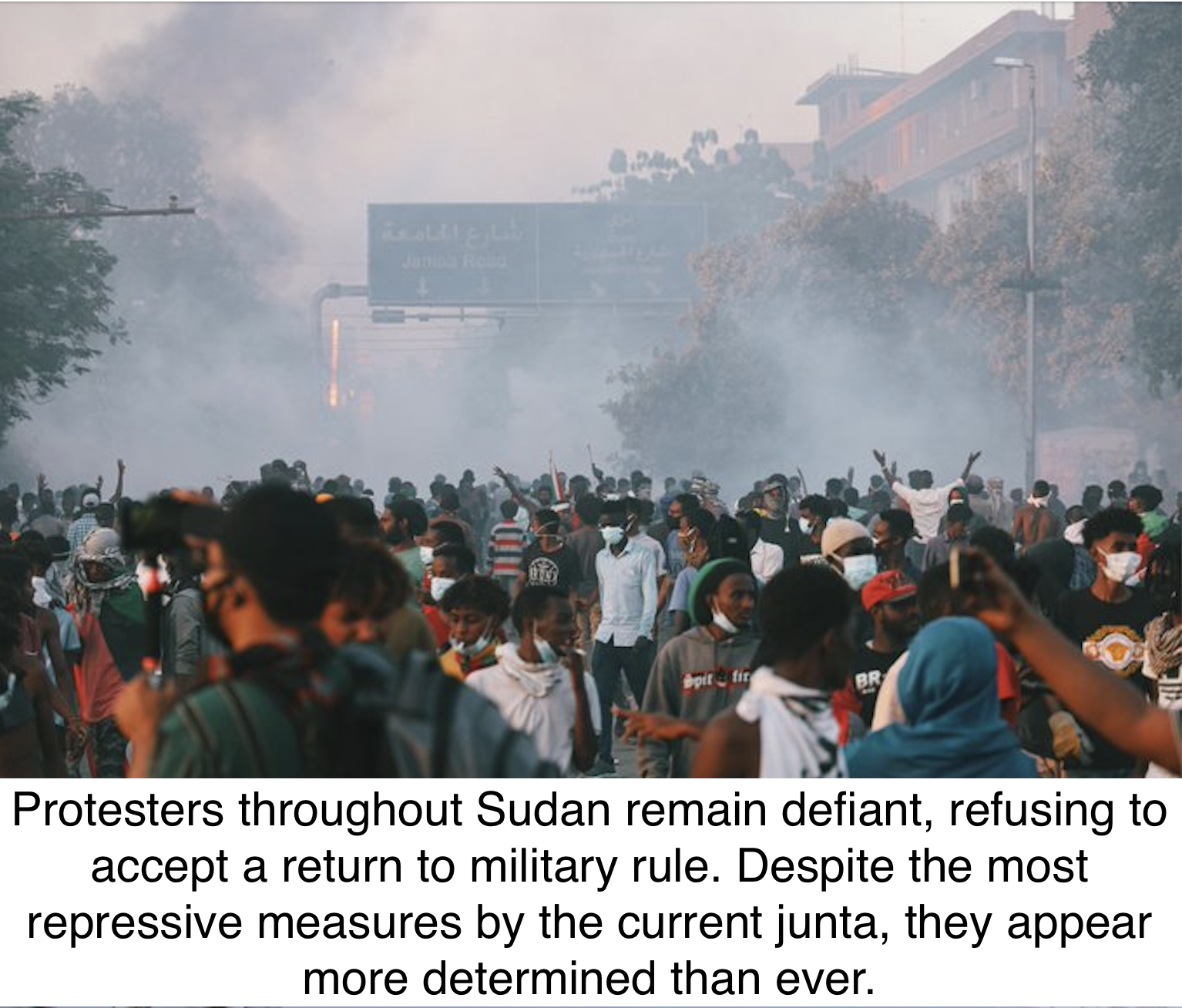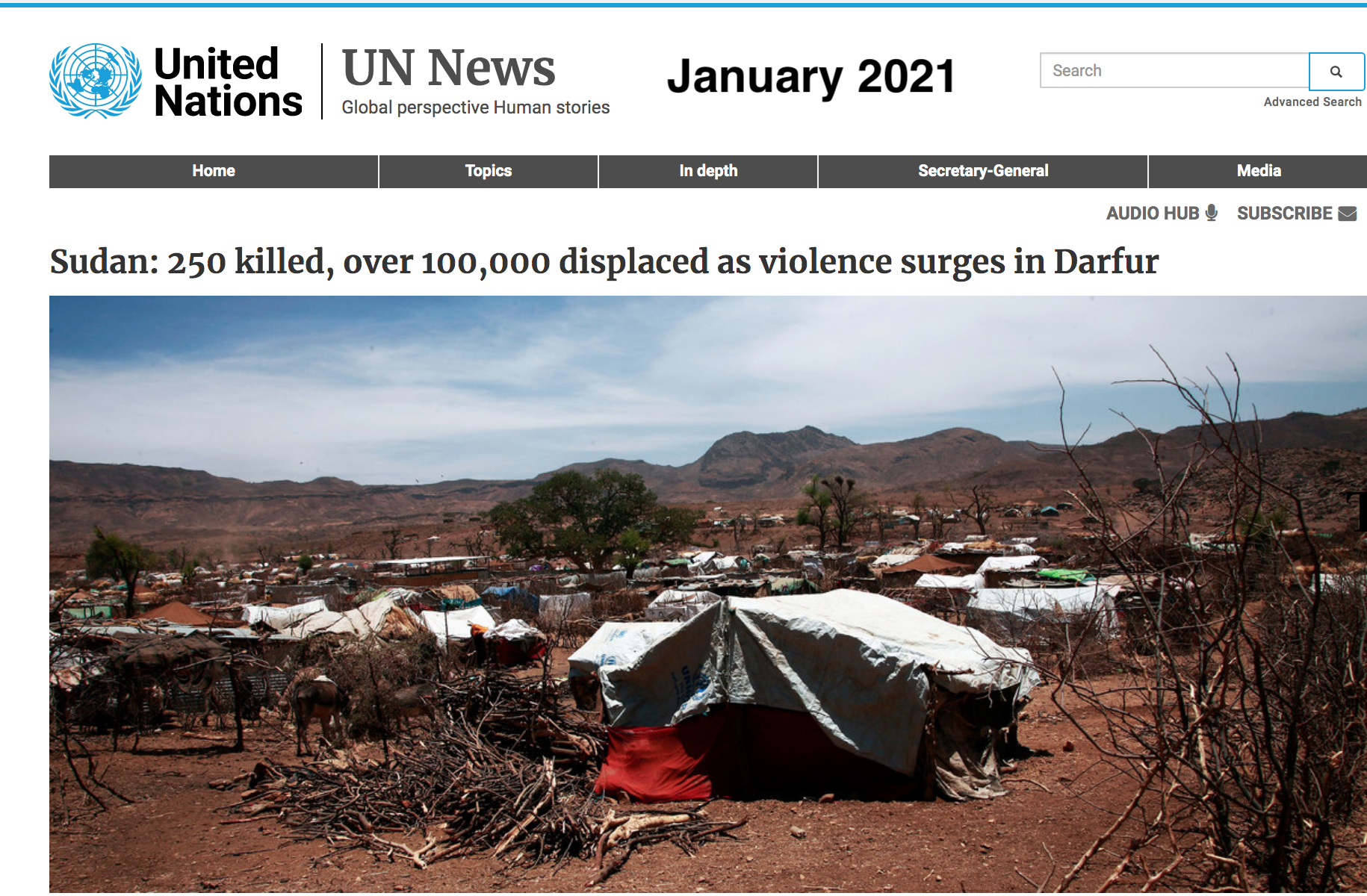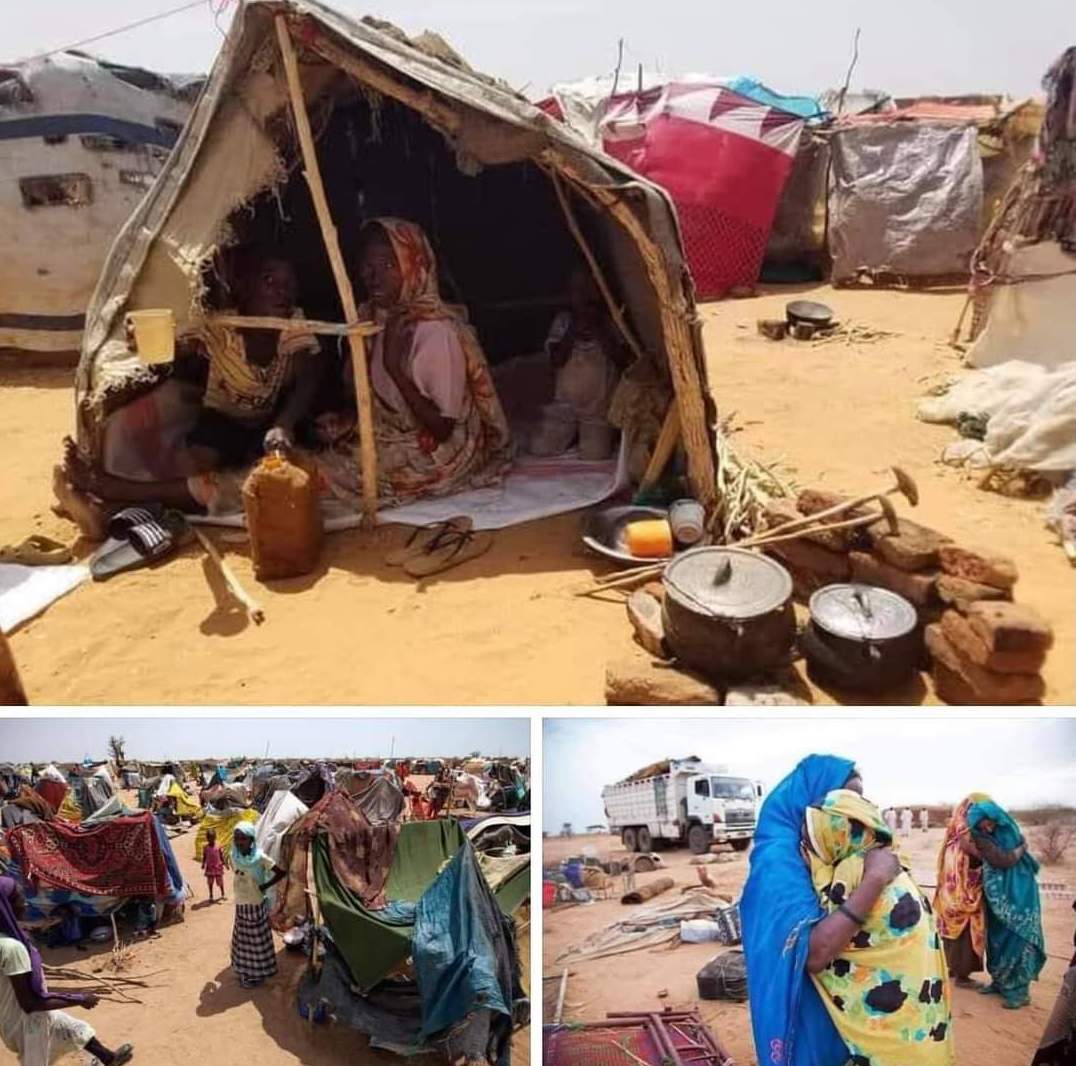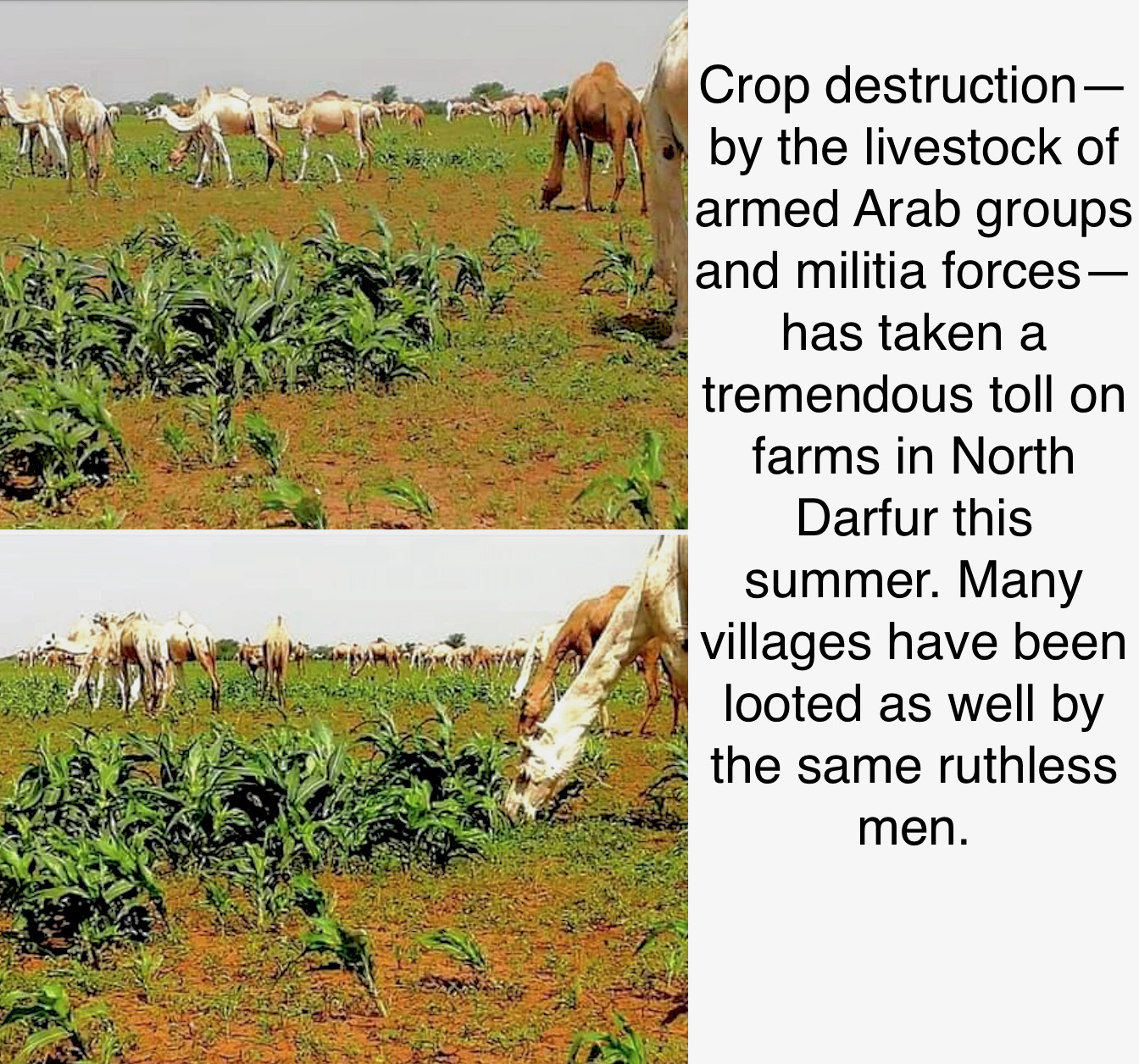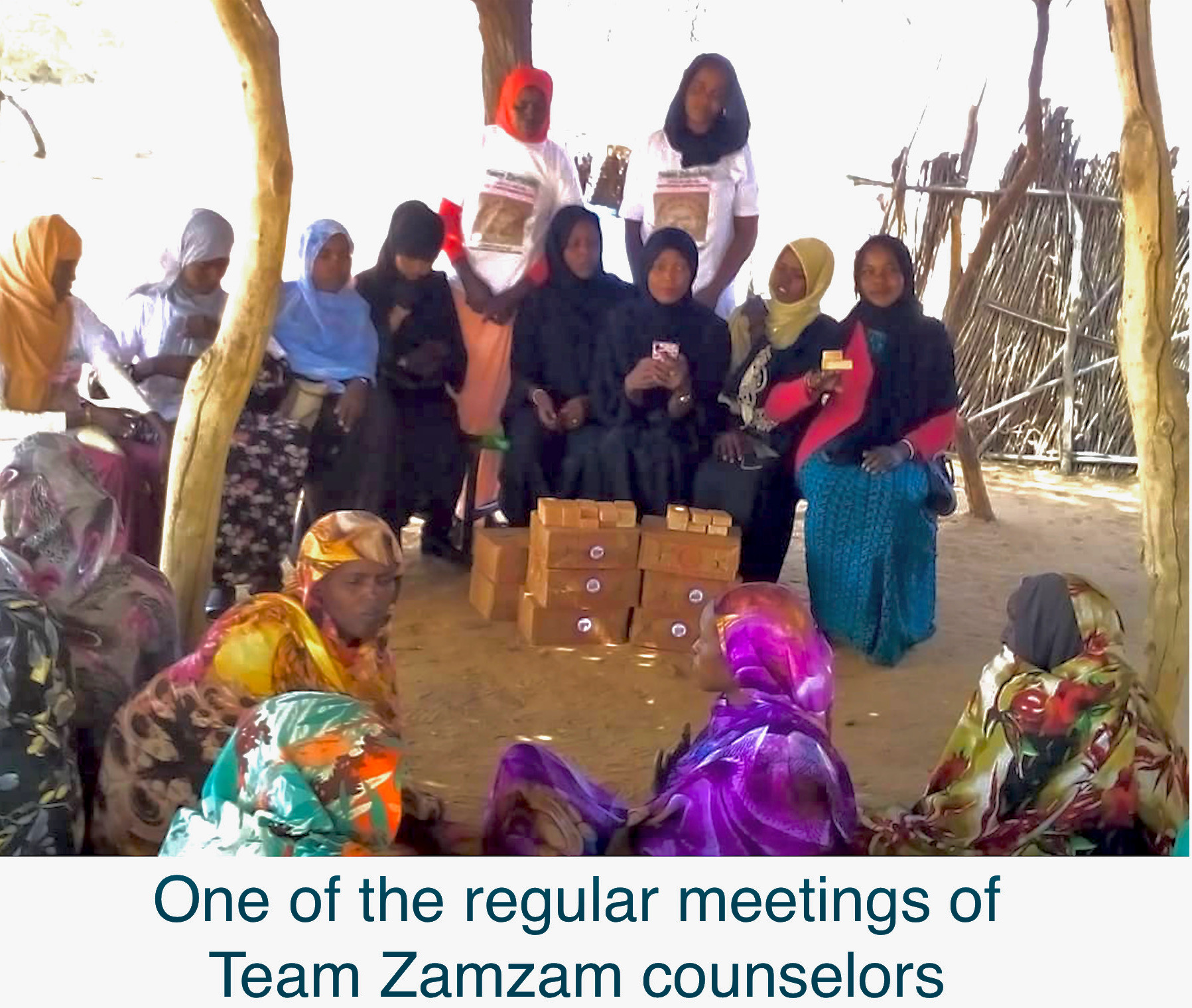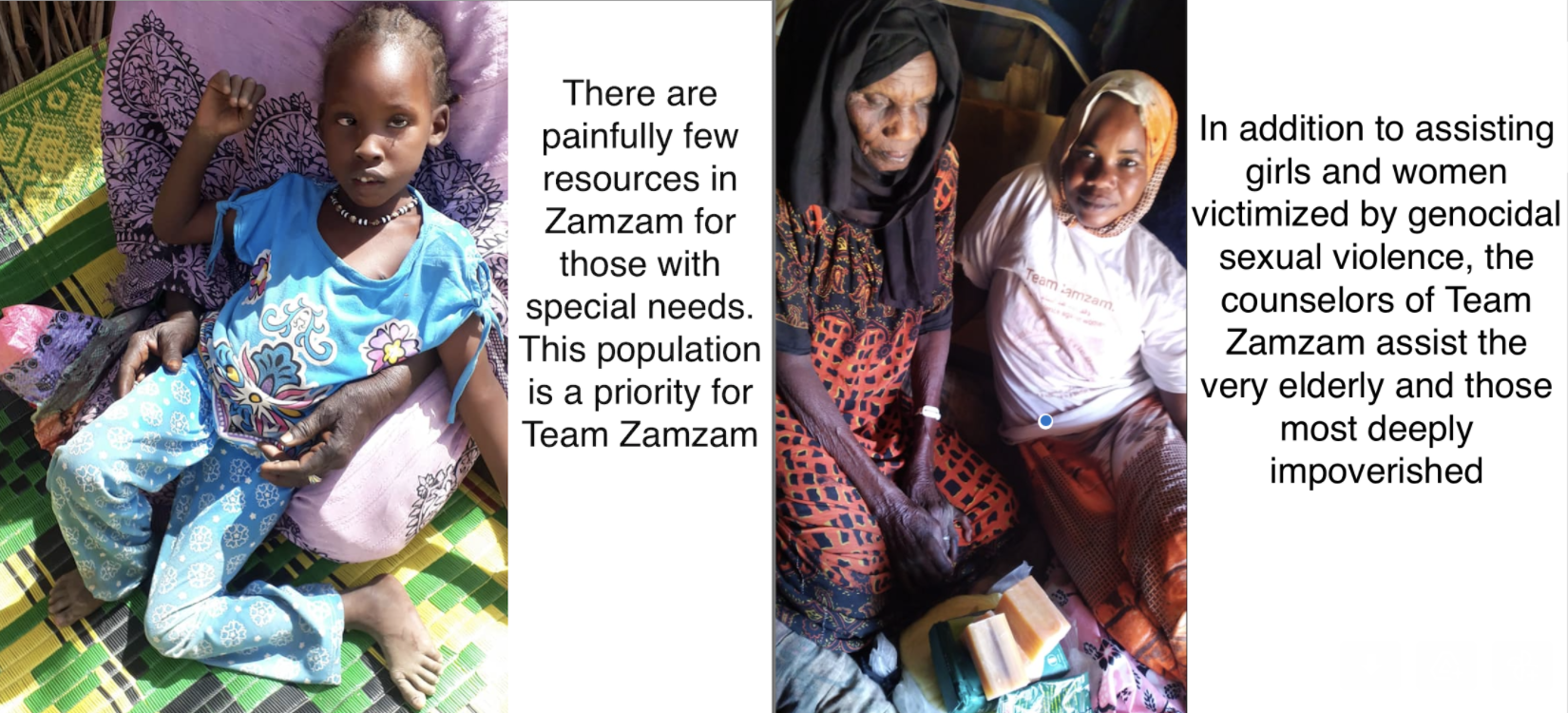Gaffar Mohammud Saeneen and Eric Reeves, Co-Chairs
Julie Darcq, Online Campaign Coordinator; Nancy Reeves, editor and financial facilitator
Overview (Eric Reeves)
Sudan as a whole continues to experience extraordinary political turmoil, with the survival of even vestiges of civilian rule deeply imperiled. As of this writing, Prime Minister Abdallah Hamdok—who was detained and held incommunicado following the October 25 military coup—finds himself in an impossible position. Although he has been restored to his position as Prime Minister, it seems highly unlikely that he will be any more than a puppet for men like coup leaders General Abdel Fattah al-Burhan, head of the army, and Dagalo Hamdan (“Hemeti”), commander of the brutal militia force known as the Rapid Support Forces. Hamdok has lost the support of the popular political forces that brought about his initial appointment as prime minister in summer 2019. Should he resign, as he has threatened to do, it is extremely doubtful that a replacement could be found who is acceptable to both the military and the political forces working for civilian governance.
[For the best, fullest, and most informed account of recent violence in Darfur and the challenges to civilian governance in the wake of the October 25, 2021 military coup, see | “Delays and Dilemmas: New Violence in Darfur and Uncertain Justice Efforts within Sudan’s Fragile Transition,” a fact-finding mission report (November 2021) | Jérôme Tubiana for International Federation for Human Rights (FIDH) and African Centre for Justice and Peace Studies]
Despite a poorly conceived and highly expedient agreement negotiated by several international actors, including the UN’s special representative in Sudan (November 21, 2021), the situation remains fraught. The agreement—between the generals who led the coup and (now released) Prime Minister Hamdok—gives little reason for optimism. The vast popular forces for change have kept up continual pressure with massive street demonstrations, demanding civilian rule with no role for the military. These demonstrations, in Khartoum and elsewhere in the country, have been met with brutal, excessive repressive force, and a number of civilians have been killed, raped, or badly injured by unconstrained security forces.
The grim default outcome for the foreseeable future is likely to be military rule with only a few trappings of civilian representation. In the long run, however, it will not be possible for the junta to survive without continual recourse to repressive actions that will only galvanize further the demand for civilian rule and democracy. And meanwhile, the Sudanese economy continues its plunge into the abyss and human displacement will far exceed 300,000 in Darfur for the current year.
In Darfur there continues to be an implicit sanctioning of violence by more and less organized Arab militia forces, especially in West and North Darfur. The areas south and west of Zamzam IDP camp have been particularly violent this past agricultural season, with a great many killed and raped (we have only anecdotal accounts, no real census) and tens of thousands of newly displaced persons. Most head to El Fasher or Zamzam; at the latter, they typically arrive destitute and often in physically poor condition.
OUR RESPONSE
Our project responding to sexual violence in the region has of necessity refocused some of its efforts and resources, particularly in the provision of food and clothing, to assist those whose suffering is greatest. The wholesale destruction of farmland and crops has greatly exacerbated food shortages, and the lack of an adequate humanitarian response ensures that serious hunger will be pervasive in the camp and North Darfur as a whole through much of 2022.
Communication with the counselors of Team Zamzam has been seriously compromised by the military coup and subsequent shutdown of telecommunication and Internet access (Internet access was again shut down on December 25). Many of the challenges have been overcome, but the limitations have had an effect on what I am able to report in a truncated time-frame for the activities and distributions carried out to this point in December.
What had been achieved in the first half of December:
Five fistula surgeries for women in critical condition, all of who have “improved positively” (patients were aged 24, 19, 26, 32, 21; see several representative testimonials below)
174 individual psychosocial counseling sessions and 51 group counseling sessions. Many of those who have benefited from the counseling sessions have returned repeatedly, finding for the first time someone to whom they can speak fully, honestly, and without shame. Some of those for whom therapy has been especially helpful now work as volunteers for Team Zamzam.
The stable cohort of 20 counselors has grown tremendously in understanding the nature of the trauma endured by victims of rape and sexual violence, and the kind of counseling that can work to ease this terrible trauma, often endured for years. These women are now highly experienced and represent some of the most important front-line medical workers in all of Darfur. They have also taken on the additional responsibility of informing people in Zamzam and outlying rural areas about the dangers of Covid-19 and what simple, practicable prophylactic measures can be taken.
Food was provided to 258 families, with a total of 1,148 beneficiaries(food deliveries included pasta, sugar, rice, tea, cooking oil, and flour)
420 bars of sanitizing soap were provided, along with an array of medicines, including analgesics, to the most needy;
54 feminine hygiene kits were provided to 54 girls and women; the kits comprise: 2 tubes of toothpaste, 2 tubes of shaving cream, 2 razor bundles contain 24 razors inside each, 1 tube of body cream, and 6 packets of menstruation cotton (containing 12 pieces each);
Funding for the monthly budget of salaries and supplies is uncertain going forward, and as a consequence this budget has been reduced from $6,500/month to $5,500 for the month of January; without major support, further reductions will be necessary. But the core parts of the budget will be untouched—salaries for the counselors (and the three men assisting with transportation/ distribution); $1,000 in food and medical supplies for the very most needy; and at least one fistula surgery (sadly the waiting list for reparative fistula surgeries continues to grow, and now exceeds 80 girls and women).
Given the sheer number of girls and women traumatized by sexual violence, the difficult decision has had to be made to reduce the number of fistula surgeries until we find greater funding (each surgical procedure has a cost of $400 at the El Fasher surgical clinic used by Team Zamzam).
Those wishing to assist in funding the work of Team Zamzam may send a check directly to Eric (Eric Reeves, 31 Franklin St., Northampton, MA 01060) or purchase one of his woodturnings:
https://www.ericreeves-woodturner.com/gallery
100% of the purchase price of every woodturning directly supports the project in Zamzam. There is absolutely no overhead for this project.
While not tax-deductible, a contribution should be made with the knowledge that our project operates with truly extraordinary efficiency, in ways matched by no humanitarian organization operating in Darfur that I am aware of.
Responding to the needs of victims of sexual violence remains the primary goal of our project, and we continue to receive from Zamzam the most encouraging testimonials from girls and women who have been assisted, either by psychosocial counseling or fistula surgery.
Testimonials received in recent months from Zamzam IDP camp in North Darfur (received via Gaffar, who has also translated them):
[1] “My name is Kalida Soubor Ahmed; I am 25 years old. For me last month was the end of the long pain that kept me in the house like a prisoner; the pain had deprived me of enjoyment normal life and stopped me from doing beautiful things. The pain was so severe that I often lost consciousness and had fever. During the last three years, I have always been living between regret, frustration, and despair, and I thought my life would end like this.
“But in the end hope came back into my life and today I feel more confident than ever. Before I received fistula surgery, I was working in the market and had experience in trading women’s clothes and artifacts. Now I am hoping to return to work immediately. Nothing is easy here in Darfur, but my confidence is very high. I can’t find words or terms to thank my Sisters from Team Zamzam for reviving hopes; but I will remain true to their friendship forever.”
[2] “My name is Jara Arbab and I’m 20 years old now. I am fine now and thank God and thanks for everyone who helped me to get a treatment, and my special thanks to my sisters of Team Zamzam who helped me with kind words and warm hugs. Had it not been for them and their constant attention, I would have still been in the bed that I have been in for almost a year and a half.
“[Ten days after my fistula surgery] the pain eased and I feel that I can do things that I have been denied in the past year and half. Now I can move and walk easily, I can wash my clothes, I can cook, and I can do many things. I missed so much going out with my friends, but now I can reward myself.”
[3] “My name is Ibtisam Abdulrahman Adam, and I’m 18 years now. Two years ago, I stopped going to school because of the pain [from traumatic fistula]. I hated myself so much that I thought of ending my life by hanging myself from a tree. I tried suicide twice, but mother stopped me. The pain was so excruciating, and the isolation from people was one of the worst things I have ever experienced. Even some my family—seven people—avoided me, and my friends from my childhood days started whispering and spreading nasty rumors about me.
“I had lost almost all hopes in life until last May [2021] when the sisters from Team Zamzam came to see me in our house. The sisters talked to me continuously for two hours and that has helped me to recover my lost confidence. I felt much better—and after they took me to the clinic [for fistula reparative surgery] my pain disappeared. I knew from day that I didn’t have the disease that ignorant people had assumed. My friends had spread about me, and that’s what was destroying my confidence; but I’m now feeling positive about myself, and I thank the sisters of Zamzam for this great change in my life.”
[4] “My name is Salima Foudal Yahya, I’m 19 years old. I have lived here in Zamzam since I was 7 years old. Several months ago, while we were working on our farm near Hillat Deba with my mother and two of my cousins, we were attacked by Janjaweed. In this attack, we could not escape and were all caught; our hands were tied to our backs, and we were horribly beaten.
“After that, we were taken into a large tent two hours away, and there the humiliation and torment began individually. I don’t know what happened to my mother and cousins in the tents, but I was insulted on turns by four men. While they are doing their bad things on me, they laughed in my face in a provocative way and waved their weapons in the air.
“After about six hours of humiliation, provocation, and torture, they let us go in the night. Some of us were naked and others without shoes. The Janjaweed threatened us not to say anything to anyone. We stayed the night on foot until we were rescued in the early morning by people in the area who were fleeing toward El Fasher.
“From that point my life changed forever. I lost feeling for everything, I couldn’t sleep like I used to, and every time I tried to sleep the voices [of the Janjaweed] woke me up. I thought of suicide; I thought many negative thinking about my life; and I didn’t want to live anymore.
“But thankfully the Sisters from Team Zamzam came to help me get through this suffering. Now I feel much better, Alhamdulillahi. All that I can think of and pray for is those who are suffering in silence. I thank everyone who helped me to get through this bad time.”
[5] “My name is Khatira Ibrahim Ahmed, I’m 46 years old and the mother of Hawa Galle Manis. Today I have come to congratulate you [Team Zamzam] on the noble work that you are doing here, and I am carrying with me a warm message of appreciation and huge thanks from my family as well. If not for your programs, today my daughter will not be able to get up from her bed, in which she stayed for two years; but thank God today, after two years of depression, pain and isolation, she is now back to her normality.
“Last month when she was taken to the clinic in El Fasher [for fistula surgery], I was deeply relieved and felt she will recover; thank God she returned well, and with high confidence.
“What destroyed our confidence and emotion was not the “illness” itself but people around us in the neighbourhood who whispered constantly about my daughter’s well-being. But now after talking to the Sisters for two months, I feel quite relieved and happy, and so does my daughter. Here in Darfur, and especially in this camp people are too ignorant about the reality of life. People here don’t understand that in life one can get sick, one can get killed, and my daughter is not any different from those many young girls who were raped by Janjaweed in their early teens.
“My daughter got sexually violated at the age of fifteen by a group of armed Janjaweed and ever since she has been carrying that pain in silence—more than three years now. If you, the sisters from Team Zamzam, weren’t here to encourage her to speak, she would have kept her ordeals in silence for the rest of her life. This attitude of silence is what is destroying the lives of many young girls in the camps. I want you to go around to see other victims in their homes in the same way you came to see us, because there are as many victims in many houses in every neighbourhood.
“The other day when people heard about my daughter’s well-being, two families from my neighbourhood came to share with me the ordeals of their adolescent girls. The main problem here is that most of the time people feel ashamed and embarrassed to talk about something of which they are not guilty; people must speak now if they want to find a solution for the stress. I thank you sisters for helping my daughter.”
[6] “My name is Kaltoum Youssif; I’m 25 years old now. I’m from Deriba village in Tawila locality. I have lived here in Zamzam for years. I want to thank the sisters of Team Zamzam for helping me to gain my well-being. I was diagnosed with fistula three years ago and at first I thought that the pain would go away within a few weeks. This is why I didn’t think to tell my family about my condition until my health became very complicated last year.
“When my family learned about my health condition, I was subjected to psychological trauma and isolation from my friends, relatives, and family, and this has worsened my psychological condition to the point of total breakdown. In addition to this, my husband divorced me without reason and went away. The divorce has destroyed my entire life, as I spent six months crying day and night. I didn’t know what I was suffering from until last year when I was taken to the clinic with the help of relatives.
“The doctor said that it’s fistula in its early stage and it can be cured but we didn’t have enough money to pay fees for treatment at the clinic. After that, I went back to the camp and continued my miserable life in pain and depression. The intensity of the pain forced me to think of suicide, because I hated living in pain and isolation.
“During my pain, all I wished for was that one day I would be able to find a way to heal myself so that I could prove myself to my husband, who left me without saying good-bye. Four months ago my life changed for the better when the Sisters from Team Zamzam put my name on a list for the El Fasher clinic. From the beginning I felt assured by their magical words and I knew my day would come.
“My treatment went well, as I expected, and today for the first time in three years I sleep well for hours. Physically, I now feel very satisfied, relieved, and psychologically very feel confident in myself. I just want to hug every one of the Sisters. They have not only helped me with their assuring words and the expenses of the clinic, but they have managed to contact my husband, who left me two years ago. He is working in South Sudan, and I don’t know how they have managed to find his contact.
“It was a remarkable effort by the Sisters and this has brought plenty of happiness to me. Since the divorce two years ago, I went through hell and all I wanted ever since he left was to have him give me a chance to explain my health situation. Today, I thank God, I heard his voice on the telephone after such a long time and there is a possibility of resolving our misunderstanding for good.
“I thank everyone who contributed for my well-being. I thank Sisters for rescuing me from hell of depression and mental distress. I thank them for mediating between me and my husband.”

